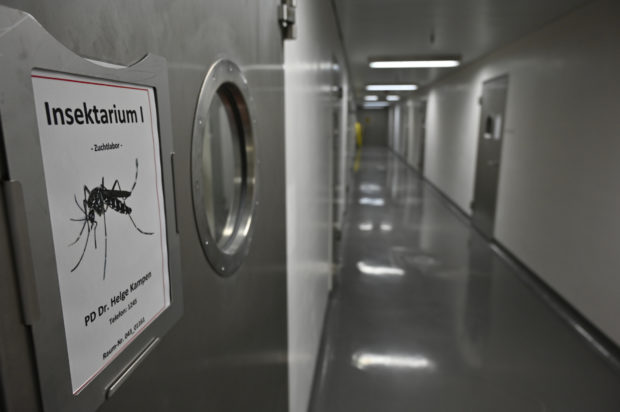Secrets of Germany’s ‘Alcatraz’ virus island revealed

The “Insektarium” where mosquitoes are kept and bred for research into mosquito-borne diseases is pictured at the Friedrich Loeffler Institute (FLI), the Federal Research Institute for Animal Health, on the island of Riems, Greifswald, northern Germany, on Aug. 7, 2019. Image: AFP/John MacDougall via AFP Relaxnews
On a Baltic Sea island once used by the Nazis for biological weapon research, German scientists are developing virus vaccines that could save lives.
Access to the island of Riems is highly restricted.
Scientists who work there have to have disinfectant showers when entering or exiting and wear bodysuits. And dozens of animals, including sheep and cows, have been deliberately infected with viruses as part of the research to monitor the effects of the diseases.
“We really are the Alcatraz of viruses, a kind of prison for viruses,” Franz Conraths, deputy head of the island’s Friedrich Loeffler Institute, told Agence France-Presse.
Located south of picturesque Ruegen Island, Reims has become a global center for the study of pathogens such as rabies, African swine fever and Ebola. Visitors have to undergo security controls and the laboratories holding the most dangerous viruses as well as the stables with the infected animals are on security level four — the highest in Germany.
Article continues after this advertisement“We do everything possible to ensure they do not spread,” Conraths said of the viruses on his island. “It’s very important for our work.”
Article continues after this advertisementPreparing for an outbreak
The Friedrich Loeffler Institute is the oldest center for the study of viruses in the world. It was founded in 1910 by Loeffler, a pioneering German scientists.
There is no installation like it in Europe, although there are similar facilities in Australia and Canada.
The institute used to be based in a single building on the island but has now expanded and covers almost the entirety of the 1.3-kilometer-long outcrop. After World War II, the center found itself in communist East Germany and began to develop vaccines. In the 1970s, it was linked to the mainland by a dam.
The government has invested some 300 million euros (P17 billion) in the institute since 2008 to upgrade the infrastructure and there are now 89 laboratories and 163 stables.
“Our biggest task is working out preparations for an outbreak,” said Conraths, giving the example of African swine fever which has been detected in Central Europe, raising concerns among German pig farmers.
“We have to expect it any day,” he said.
There are between 80 and 100 large animals on the island: alpacas, boars, cows, goats, and sheep. The researchers said that when the animals get too sick they are put down so as not to let them suffer.
“We do our best to carry out our research without having to do tests on animals,” said Martin Beer, head of the institute’s diagnostic department.
But he added that “only by infecting an animal” could researchers work out why animals get sick, how the illness develops and how the animals react.
Since the tests are for vaccines that can save millions of animals, protect farmers’ livelihoods and alleviate hunger, Beer said they were “justified.” CL/JB
RELATED STORIES:
Polio returns to haunt Malaysia after almost 30 years
Second Ebola vaccine to be used in DR Congo next month